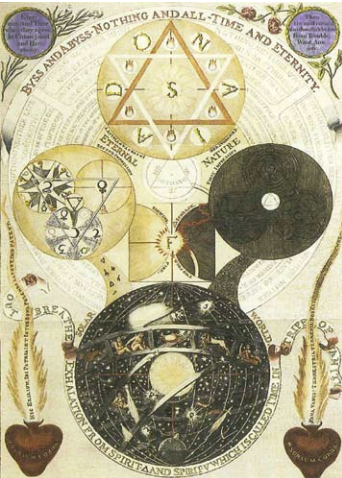The Traditional Martinist Order
The Traditional Martinist Order is an Initiatic Order and a school of moral chivalry with its roots in the Western esoteric tradition.
Its name is derived from that of Louis Claude de Saint-Martin, a great mystic and powerful Illuminist living in France in the 1700s. He wrote many books under the name of "The Unknown Philosopher" concerning our nature and our relationship to the universe. Through him, the Traditional Martinist Order is linked to a tradition with roots going back to the Primordial Tradition, at a time when humanity was privileged to unite itself freely with the Divine, without any intermediary.
What Martinists Study
Martinists study the natural relationships that exist between the Divine, the Universe, and Humanity. The universe and humanity form a whole, two progressions linked one to the other and evolving together. If we wish to understand our true nature we must look toward the Divine, says Saint-Martin, for "we can only read ourselves in the Divine, only understand ourselves in the Divine splendor." If we are no longer in a position today to reach this understanding it is because we have made the error of separating ourselves from the Divine and losing ourselves in the world of appearances, the temporal world. We have, to some degree, fallen asleep to the spiritual world. Our inner Temple is in ruins.
To become a Martinist is to undertake the reconstruction of the Inner Temple. The Martinist relies on two pillars to build this everlasting Temple—that of initiation and that of the Martinist teachings. Initiation denotes the beginning of this great work, for it is at this moment that we receive the seed of light that constitutes the foundation of our work. It is then up to us to work to bring into being this light and make it shine.
Worldly initiations are a necessary preliminary to Martinists, though we see them as earthly representations of a greater transformation. They only become meaningful when we receive the “central initiation.” Saint-Martin tells us that this initiation is that by which “we can enter into the heart of the Divine, and make the Divine’s heart enter into us, there to form an indissoluble marriage which will make us the spouse of our Divine Redeemer. There is no other mystery in arriving at this holy initiation than to delve further and further into the depths of our being, and not let go until we can bring forth the living, vivifying root, because then, all the fruit which we ought to bear, according to our kind, will be produced within and without ourselves naturally."
The Martinist Teachings
The teachings represent to a Martinist the nourishment necessary for the growth of the seed received during initiation. The foundations of the teachings are the writings of Louis Claude de Saint-Martin and his teacher, Martinès de Pasqually.
Martinist study includes: Mystical symbols; Free will and Destiny; Dreams and Initiation; Science of numbers; Prayer; Cycles of humanity; Art, Music, and Language; and the Kabbalah.
Becoming a Martinist
Home Study
 To all those interested in pursuing the Martinist teachings, we offer an Oratory or Home Study program. This type of membership entitles you to receive four Martinist discourses every month, to be studied in a manner that will be indicated to you. Although self- initiation is not part of the Martinist system of study, you will receive a ritual to mark the beginning of each level in your Oratory work.
To all those interested in pursuing the Martinist teachings, we offer an Oratory or Home Study program. This type of membership entitles you to receive four Martinist discourses every month, to be studied in a manner that will be indicated to you. Although self- initiation is not part of the Martinist system of study, you will receive a ritual to mark the beginning of each level in your Oratory work.
Oratory study will familiarize you with the theoretical teachings of the TMO, however it will not offer the three traditional initiations, which confer upon you the status of a true Martinist initiate. Instead you become a student of Martinism.
You may apply to become a student of Martinism at www.martinists.org.
Heptad Membership
The traditional method of Martinist membership is offered through initiation and learning in a Martinist Heptad. Work in the Heptad is conducted in the strictest traditional manner, and initiations are conferred with the active physical presence of the candidate and an initiator, who is an officer duly initiated and empowered by the directives of the Martinist Tradition to initiate others.
This form of affiliation is open to those who are able to attend the meetings or classes, called "conventicles," which are held monthly at a local Heptad. These meetings are conducted in the Heptad temple, and include a Martinist ritual followed by an active discussion among class members and the class master of the concepts presented in the Heptad discourse. Members who complete their studies and initiations in the Heptad, which takes a minimum of six years, become full-fledged initiates in a chain of Light extending back to Louis Claude de Saint-Martin himself. Smaller Martinist groups, known as Ateliers (Workshops), also offer classes and the Associate Degree Initiation.
Once you have been accepted as a member of the Grand Heptad, please join us at www.martinistcommunity.org to connect with other Martinists and to find the Heptad nearest you. Membership in a local group may require modest dues to help support the expenses of the local Heptad or Atelier.
New Videos
Introduction to the Traditional Martinist Order

“People of peace, men and women of desire, such is the splendor of the Temple in which you will one day have the right to take your place. Such privilege should astonish you less, however, than your ability to commence building it down here, your ability, in fact, to adorn it at every moment of your existence. Remember the saying 'as above, so below', and contribute to this by making 'as below, so above'.”
–Louis Claude de Saint Martin


